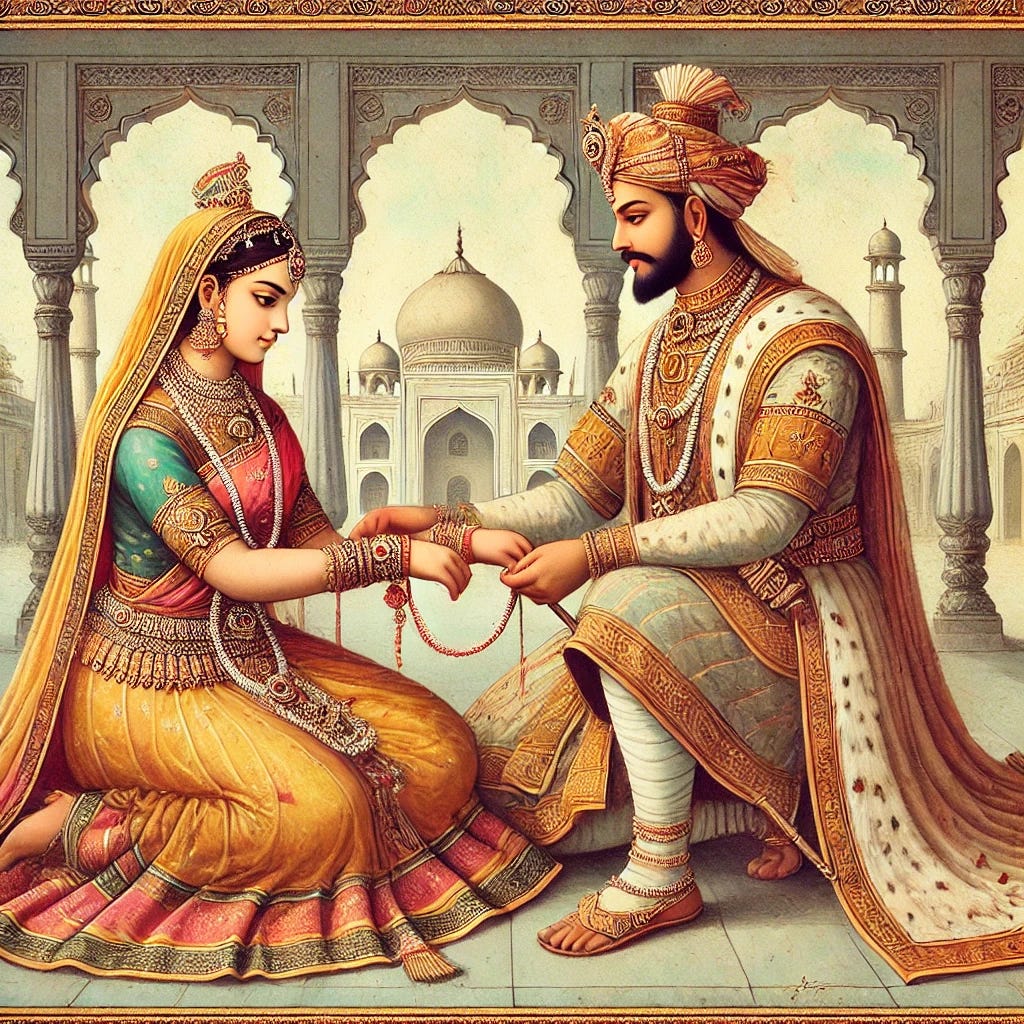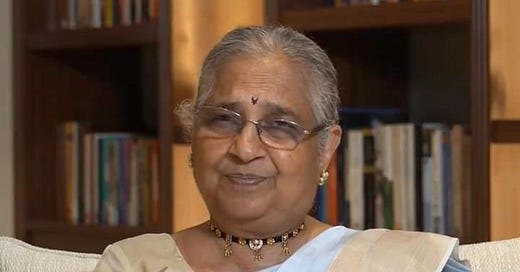Madam Sudha Murty: "Please Don't Distort the History of Our Rakhsha Bandhan"
Her claim that Raksha Bandhan originated with Rani Karnavati of Mewar and Mughal Emperor Humayun is not only historically inaccurate but borders on the absurd.

Sudha Murty's Controversial Raksha Bandhan Tweet
On the auspicious occasion of Raksha Bandhan, a festival celebrated across India to commemorate the bond between brothers and sisters, Sudha Murty, a well-known author and philanthropist, now nominated as a Member of Parliament in the Rajya Sabha, made a statement that ignited a firestorm of controversy. In her tweet, Murty claimed, "Raksha Bandhan has a rich history. When Rani Karnavati was in danger, she sent a thread to King Humayun as a symbol of sibling-hood, asking for his help. This is where the tradition of the thread began, and it continues to this day."
This statement (video here), seemingly intended to highlight the historical significance of Raksha Bandhan, drew widespread criticism for allegedly distorting history and undermining India's rich and ancient traditions by involving a Mughal Emperor in the narrative. We were also among the first to contest her version on twitter1.
The Rani Karnavati-Humayun Story
Sudha Murty’s assertion that Raksha Bandhan originated from the story of Rani Karnavati and Humayun has been met with scepticism and criticism from various quarters. The tale suggests that Rani Karnavati, the widowed queen of Mewar, sent a Rakhi to Mughal Emperor Humayun, seeking his protection against the advancing forces of Bahadur Shah of Gujarat. However, historians widely dispute the authenticity of this account.
Historical Inaccuracies
Timeline Discrepancy
One of the major flaws in Murty's account is the timeline. The story of Rani Karnavati and Humayun is situated in the 16th century, while the festival of Raksha Bandhan is believed to have origins that significantly predate this period. The ancient roots of the festival are mentioned in Hindu texts and mythology that are thousands of years older than the Mughal era.
Lack of Historical Evidence
There is no concrete historical evidence to support the specific incident between Rani Karnavati and Humayun. While the story is popular in certain narratives, it lacks the corroboration of reliable historical sources, making it more of a legend than a documented fact.
Earlier Origins
The origins of Raksha Bandhan are much older and are deeply embedded in Hindu tradition. The festival has been mentioned in ancient texts, and its significance has been celebrated for centuries, long before the Mughals arrived in India. Thus, attributing its origins to a 16th-century event involving a Mughal Emperor misrepresents the rich history of this cultural tradition.
Actual Origins of Raksha Bandhan
Mahabharata Connection
The festival of Raksha Bandhan is often associated with the story of Lord Krishna and Draupadi from the Mahabharata, which is a central epic of Hindu culture, predating the Mughal era by thousands of years. According to this story, Draupadi tied a strip of cloth to Krishna's wrist, and in return, he vowed to protect her, symbolizing the bond celebrated during Raksha Bandhan.
Vedic Origins
Some scholars trace the roots of Raksha Bandhan back to Vedic times. The festival is linked to various rituals and practices mentioned in Vedic literature, further establishing its ancient origins. These rituals often involved the tying of protective threads, which is a practice that continues in various forms even today.
Hindu Calendar Significance
Raksha Bandhan is traditionally observed on the full moon day (Purnima) in the Hindu month of Shravan. This time of the year holds significant spiritual importance, further linking the festival to ancient Hindu practices rather than to the events of medieval India.
Other Versions
Indra and his wife Indrani
Raksha Bandhan has its roots in ancient traditions, where it began as a ritual involving the tying of a protective thread, or "Raksha Kavach," by women on the wrists of men to provide protection, as per a respected twitter handle “Lost Temples”.
The earliest recorded instance is when Devi Indrani, following the advice of Guru Brihaspati, tied a Rakhi on Indra Deva's wrist during a battle against the asuras. The empowered thread, tied on Shravana Purnima, helped the gods achieve victory. This practice, as documented in the Bhavishya Purana and Skanda Purana, symbolized a woman offering protection to a man, not seeking it.
Transitioned into Brother-Sister Love
Over time, this tradition evolved, with sisters tying Rakhi on their brothers’ wrists. The underlying concept remained the same— the sister provides a protective talisman, and in return, she seeks her brother’s love and protection, often symbolized through a gift. Other stories associated with Raksha Bandhan include Yamuna protecting Yama with a Raksha Kavach, Draupadi protecting Krishna, and Devi Lakshmi tying a Rakhi on King Bali to secure the return of her husband, Vishnu, to Vaikunth. These tales reflect the festival's rich and diverse cultural significance.
Public Reaction
Sudha Murty’s tweet has not only sparked a debate but also led to widespread backlash on social media. Critics have expressed their discontent with her portrayal of Raksha Bandhan's origins.
Criticism of Historical Knowledge
Many social media users voiced their disappointment in Ms Murty’s apparent lack of historical knowledge, questioning her understanding of Indian festivals and culture. As a respected figure in Indian society, and now a nominated member of the Rajya Sabha, her statements carry considerable weight, making historical inaccuracies all the more problematic.
Accusations of Promoting "Fake History"
Some critics went further, accusing Ms Murty of promoting a "fake history" narrative. They argued that the story involving Rani Karnavati and Humayun is a fiction created by certain historians, with no real basis in historical fact. These critics urged Ms Murty to retract her statement and promote accurate historical information.
Calls for Accurate Information
In light of the controversy, there have been numerous calls for Ms Murty to educate herself on the true origins of Raksha Bandhan. Critics have pointed out the importance of relying on older Hindu traditions and texts to understand the festival's significance, rather than perpetuating popular myths that lack historical grounding.
Summing Up
While Sudha Murty’s intention in sharing the story may have been to promote Hindu-Muslim unity, the historical inaccuracies in her statement have had the opposite effect, leading to widespread criticism. Given her influential position as a Member of the Rajya Sabha and a public intellectual, it is crucial that she exercises greater caution in her public statements. Acknowledging the mistake and apologizing could help mitigate the backlash, and in the future, it would be wise to steer clear of unverified myths when discussing India's rich cultural heritage.
Dilution, not Retraction
After the huge outrage, Ms Murty was compelled to issue the following supplementary statement, also on X (formerly Twitter):
“The story I shared on Raksha Bandhan is just one of many tales associated with the festival and certainly not its origin. As I have said in the video clip, this was already a custom of the land. My intention was to highlight one of the many stories I learnt about when growing up, about the beautiful symbolism behind Raksha Bandhan. Raksha Bandhan is a much older tradition that has transcended time and culture of our beloved country, one that I am proud of and look forward to with affection for my own siblings.”
This is not a retraction but under the circumstances, we should gracious enough to accept this close the matter.
Citations
Here are the citations as clickable links with descriptive text:
IndiaTimes: Sudha Murty's Raksha Bandhan Origin Story Faces Backlash for 'Fake History' Claims
Hindustan Times: Sudha Murty Video on Raksha Bandhan Met With Storm of Criticism—Here’s Why
NewsBytes: Sudha Murty Trolled for Raksha Bandhan Origin Post
Humayun tumbled through life and tumbled out of it. He could not sit on the throne of Delhi once he was driven out by Sher Shah Suri – not until the latter’s death at least. How could he afford to defend any Hindu Rani?




